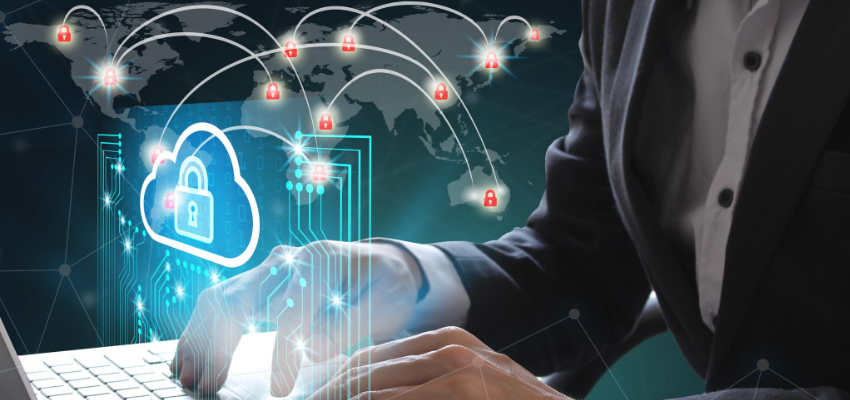Show:
Importance for Cyber Security in Banking Industry
Banks, insurance companies, and investment banks are using the best safety solutions because they have become more dependent upon technology.
Goldman Sachs, Morgan Stanley, BNP Paribas, JP Morgan, and other financial institutions quickly enlist cybersecurity experts. JP Morgan has a USD 12 billion tech budget, with regulatory spending expanding faster. Similarly, Citigroup spent USD 8 billion each year on technology, with spending on security outpacing spending on running or developing the company.

Financial services industry has been forced to address cybersecurity due to cybercrime. According to the bank’s Financial Institutional Survey, worries over cybercrime (29 percent) have risen from eighth place in 2018 to fourth place. Given the importance of the job, cybersecurity aristocrats earn up to nearly USD 0.3 to 0.6 million.
Let’s look at why investment banks are becoming targets for cybercrime.
Cyber Security’s Importance
The primary reason for cyber security’s importance in banking transactions is to safeguard consumer assets. With more people going cashless, people are increasingly using online checkout pages and physical credit machines. PII can either be routed to another location or used for nefarious purposes.
Customers are affected as well. Meanwhile, the bank also suffered significant damage as officials attempted to restore the data. The bank may have to pay substantial amounts of money to get the information back if it is seized. As a result, their consumers and other banking institutions lose faith in them. When actions for cyber security banking aren’t taken, this is not the only event that occurred. The customer must cancel all their credit cards and open new accounts, maybe with a different bank. Even if the FDIC ensures their assets, fraudsters still attempt to steal their personal information.
Banking’s Top Three Cyber-Threats
There’ll always be risks in life, but understanding which ones to be aware of will help you avoid them in the future. Here are the top three cyber dangers that banks should be aware of:
1. Breach of third-party data
Hackers will constantly come up with new ways to attack data security. Thanks to modern bank services and internet platforms that allow for quick transactions and account maintenance, a new door has opened. Hackers are using standard financial systems and third-party networks to carry out raids as banks and consumers grow more digitally intertwined. Hackers can easily access the network if a cybersecurity plan does not adequately protect these systems.

2. Mobile applications
Cybersecurity threats rise as more people use mobile apps to access their bank accounts. Because most people do not actively safeguard their personal devices, they have little to no data security in the case of an attack.
As a result, the scale of an attack is significantly increased. To avoid harmful activity, you’ll need to use a safe method to create fintech mobile application & new cybersecurity technologies for your banking application.
3. Cyber-attacks on Cryptocurrency
Cryptocurrency, which was created in 2009, is still relatively young, and many of the decentralized currency marketplaces are not sufficiently secured. Many significant breaches on crypto exchange and other cryptocurrency-related services have occurred during the last ten years as a consequence of hacking, malware, and targeted attacks. The unpleasant reality in the market is that there aren’t many options to deploy banking cybersecurity technology in crypto outside of crypto wallets & blockchain technology. Attackers will have an easier time stealing bitcoin and profiting on market gains if security is not improved.
4 Reasons Why Cybersecurity Is Critical In The Cyber Security Investment Banking Industry
Your money should be safeguarded physically, but it is now just as crucial to safeguarding it digitally. The following factors contribute to the importance of cybersecurity in the banking industry:

1. Avoid incurring financial losses
Imagine going online to transfer money from your account and discovering a string of big bogus charges in your transaction history. When this happens, a person’s funds are usually swiftly restored by their bank, but that is not always the situation with a data breach.
When a bank suffers a cyber attack that results in losing customer money, it can take a long time for those monies to be recovered. It will harm the bank’s reputation, but it also puts the consumer under a lot of stress. Banks must establish a cyber risk management plan that safeguards their network from any breach efforts and ensures financial security for their clients in order to prevent breaches.
2. Keep consumer information safe
It’s too late once a client notices fraudulent conduct. When a customer’s private data is stolen or hacked, the volume at which it is disseminated can make it difficult to undo the damage. Cybercriminals sell personal information on the black market to be utilized in future hacking operations and breaches. As banks grow their customer base, they must guarantee that suitable cybersecurity systems are in place to secure their network and, more crucially, the personal information of their client’s information.
3. Maintain the bank’s good name
According to Security Magazine, 80 percent of customers won’t do business with a company if their data is hacked, and 85 percent will tell other customers about it. For a corporation, especially a bank, reputation is crucial. Good cybersecurity practices and ongoing security monitoring reflect favorably on a bank and help to build confidence. This is critical in a business that is accountable for each customer’s financial well-being and personal information.
4. Avoid fines from the FDIC if you don’t follow the rules.
Rules and regulations protect customers, and if these standards are broken or ignored, banks face severe consequences for noncompliance. These penalties can be difficult to recoup, and they may cause future consumers to doubt their bank’s honesty. If a bank is hacked due to non-compliance, it is likely to suffer a succession of setbacks.
How To Protect Yourself From Cyber-attacks?
When you assess the current state of internet security, you should consider enhancing or completely replacing your existing protection apps. In the area of banking software development, there are a few factors to consider.
Security audit
Cyber security software must be thoroughly audited before being implemented. The audit reveals the system’s advantages and disadvantages. Additionally, it provides recommendations that can help you save money while enabling you to make smart investments.
Firewalls
In order to prevent attacks, cyber security banking requires not only apps but also proper hardware. Using an updated firewall & new cybersecurity technologies, banks can block harmful activity before it reaches other parts of the network.
Anti-virus And Anti-malware Software
Firewall upgrades improve security, but you can’t prevent attacks without updating anti-virus and anti-malware software.
It is possible that older software may lack the most current virus signatures and regulations. This may result in your system being overlooked by a potentially catastrophic attack.

Multi-factor authentication (MFA)
Investment banks must create fintech mobile application with MFA, or multifactor authentication, which is vital for users who conduct their banking through mobile or internet applications. Many users do not change their passwords on a regular basis. Or, if they do, they make little adjustments. The MFA system prevents attackers from gaining access to the network by requiring an additional layer of security. A six-digit code, for example, might be delivered to a customer’s cell phone.
Biometrics
It is a more secure type of MFA than text code. This type of authentication uses retina scans, fingerprints, or facial recognition to validate a user’s identity during the mobile payment gateway that helps them to make secure transactions. Despite the fact that this authentication form has been hacked in the past, it is more difficult to do today.
Automatic logout
A user can stay logged in indefinitely if a website or app allows it. Therefore, they can access their data at any time without having to input their login credentials. However, attackers will be able to get your records as a result of this readily. Logging out automatically reduces this risk by denying access to a user after a few minutes of operation.
Education
All of the proposed solutions can help to improve cyber security in the banking sector. In the event that clients continue to access their data through unsecured areas or save their credentials incorrectly, they won’t be able to assist. Therefore, getting a good education is crucial. Banks have the potential to change their customers’ behavior when they inform them of these vulnerabilities.
Final Word On Investment Banking Cybersecurity
Investors look for companies that have safe systems, make money, have a significant market share, are well-valued, and have room to grow.
While the cyber security investment Banking Industry is digitizing, fraudsters are gaining access to the system by exploiting flaws. Furthermore, the current COVID-19 controversy has heightened the situation, raising security worries. The costs of these offenses can bankrupt a firm and cause clients to lose interest.
It is critical to involve all employees in security practices and turn them into strong links to break the security chain more easily.
A top custom software development company in USA like Groovy Web with cybersecurity expertise and other technical expertise will be required in order to create fintech mobile application.
About the author:
Krunal Panchal is the CEO and Co-Founder of Groovy Web. Krunal has been a hardcore programmer from the age of 11 and began his professional career at an early age. Because of his analytical and logical mindset, he opted coding as a professional choice. During the initial phases, he gained tremendous knowledge as well as a love for innovation and entrepreneurship. Learning a new skill is a never-ending process for krunal. Groovy Web has evolved into a well-established organization that serves industries ranging from startups to multinationals organization.

 Return to Previous Page
Return to Previous Page








